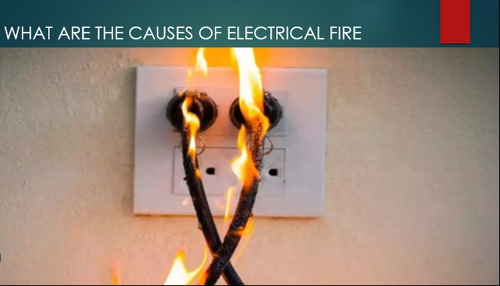
Electricity has become part of our daily lives and we all rely on it to power our home appliances, industrial machines, street lights and now electric motors.
While it comes with lots of benefits, electricity can pose a serious fire risk if mishandled.
This article will reveal what an electrical fire is, the causes and how to put out an electrical fire if it arises.
Read on for complete details.
What is an electrical fire
An electrical fire is a fire that arises from an electrical system. It occurs due to ignition from faulty electrical wiring, overloaded circuits, or damaged electrical components.
It can start suddenly and spread quickly, putting lives and property at risk.
In the United States alone, there have been a record of about 24,200 fires in 10 years (2012-2021). Causing about 295 deaths, 900 injuries and a loss of over one billion dollars worth of properties.
It is therefore important for homeowners to be aware of how electrical fires start, so they can take preventive measures.
Causes of electrical fires
Electrical fires can spark up for many reasons, but the most common ones are:
Outdated Wiring
Over time, electrical wires can become weak, loose and unable to handle the demand of some electrical appliances. Usually, circuit breakers are designed to trip on circuit overload but if they are old or have some worn out connectors, they may fail. Leading to a fire outbreak.
Faulty outlets and sockets
If you have a faulty outlet or worn out socket in your home that is not grounded, it can start up a fire. It is therefore important to occasionally call a licensed electrician to inspect your wiring system.
Old or faulty appliances
Just like outdated wiring, old appliances can be a fire hazard as they may not be up to standard in terms of material quality and safety regulations.
It may also have a worn cord which can easily overheat and start a fire.
Overloaded circuit
When you plug too many appliances into one circuit or extension lead, it can draw more current than rated. Excessive current draws can generate high amounts of heat and ignite fire.
Faulty lighting fixtures
Defective bulbs, lamps, and other lighting fixtures can emit excessive heat that can induce fires. Using more bulbs on a circuit than rated can also be a common cause of electrical fire.
Lack of Maintenance
Dust buildup inside appliances, frayed cords that go unreplaced, and ignoring warning signs like dimming lights or flickering outlets can all lead to fire hazard.
How to put out an electrical fire
The best way to put out an electrical fire is to prevent the occurrence. But if by peradventure it starts in your home, there are a few steps you can take to put it off. These include:
Cutting off the power source
The first step to managing an electrical fire is by cutting off the source if it is possible. Unplug the appliance or turn off the circuit breaker that controls the branch circuit if the fire has spread. Avoid using water on the fire if the power is still ON, to avoid electrical shock.
Smother the fire
If the fire is still small, you can smother it using baking soda. Baking soda works by blocking oxygen that causes fire to burn.
However, make sure you turn off the power source before using this method, or avoid touching any appliance while you put out the fire.
Alternatively, you can also use a fire blanket or a thick, dry cloth to smother the flames but you should be careful so that the cloth will not catch fire.
Use a class c fire extinguisher
As part of the home and electrical safety, homeowners supposed to have a multipurpose fire extinguisher. The ABC fire extinguisher is multipurpose and can also be used to put out different types of fire including an electrical fire.
Evacuate and call the fire service men
If the fire is so large that you cannot extinguish it yourself, evacuate everyone from the building and call the fire department for help.
How to prevent an electrical fire from occurring
To ensure that your home’s electrical system is safe from potential fire, there are some precautions you must take. These include:
Request for an electrical inspection
Call an electrician to inspect your home wiring system to make sure they are up to NEC standard. It is also important to have AFCI protection in your home.
AFCI breakers help to detect potential electrical issues that are not detected by standard circuit breakers and cut off the circuit.
Avoid overloading the circuit
A single circuit is designed to carry a certain amount of load. If you plug more appliances on an extension cord or circuit than rated, it may short circuit and heat up the electrical system, causing a fire.
Do not use damaged electrical cords
If any part of your electrical cord or extension is damaged, replace it immediately. Damaged cords can lead to several hazards such as electrocution and fire outbreaks.
- Pay attention if you notice any signs of electrical failure such as buzzing sounds, flickering lights, burning smell and frequent tripping of your breaker.
- Keep flammable materials away from electrical devices and appliances.
- Have a fire extinguisher readily available and learn how to use it effectively.
- Never leave an electrical device unattended or plugged in overnight.